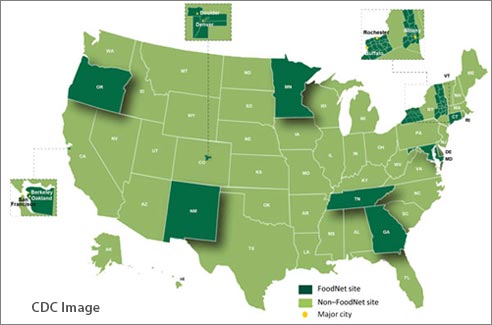In 1995, the CDC (with support from the U.S.D.A.) established the Foodborne Diseases Active Surveillance Network (FoodNet) to track infections transmitted by food, to identify outbreaks of illness and to help find and study the sources of those infections.
It is a collaborative program among CDC, 10 state health departments, the U.S. Department of Agriculture’s Food Safety and Inspection Service (USDA-FSIS), and the Food and Drug Administration (FDA).

Currently, FoodNet conducts surveillance for the infections from the following pathogens diagnosed by laboratory testing of samples from patients.:
- Campylobacter
- Cryptosporidium
- Cyclospora
- Listeria
- Salmonella
- Shiga toxin-producing Escherichia coli (STEC) O157 and non-O157
- Shigella
- Vibrio
- Yersinia.
FoodNet staff in the 10 states involved in the program receive reports of every identification of one of the above pathogens from from tests on patients’ specimens. It then tracks metrics related to reporting, including demographic information and whether the person was hospitalized, died, part of an outbreak and/or had traveled internationally.
The stated objectives are as follows:
- Determine the burden of foodborne illness in the United States;
- Monitor trends in the burden of specific foodborne illness over time;
- Attribute the burden of foodborne illness to specific foods and settings;
- Disseminate information that can lead to improvements in public health practice and the development of interventions to reduce the burden of foodborne illness.
A new article in Emerging Infectious Diseases (a CDC publication), looks at FoodNet’s first 20 years. Below are some of FoodNet’s accomplishments that are highlighted in the article.
Read about our Food Safety Scholarship.
FoodNet’s annual report of confirmed infections caused by major pathogens, published within months of the end of each calendar year, is sometimes referred to as the foodborne illness “report card” for the nation. Public health officials, regulatory agencies, and industry use it to gauge progress in food safety and to determine when new policies and prevention efforts are needed.
FoodNet’s major contributions include the establishment of reliable, active population-based surveillance of enteric diseases; development and implementation of epidemiologic studies to determine risk and protective factors for sporadic enteric infections; population and laboratory surveys that describe the features of gastrointestinal illnesses, medical care–seeking behavior, food eating patterns, and laboratory practices; and development of a surveillance and research platform that can be adapted to address emerging issues. It is the only US system focused on obtaining comprehensive information about sporadic infections caused by pathogens transmitted commonly through food.
A Few FoodNet Accomplishments
The article points out some of the many FoodNet accomplishments, including the following:
- A FoodNet case–control study linked fluoroquinolone-resistant Campylobacter infections with eating poultry at a commercial establishment and with international travel. Data from this study contributed to the body of evidence that led FDA to withdraw approval for the use of fluoroquinolones in poultry.
- FoodNet site epidemiologists are leaders in the investigations of a multistate outbreaks, helping health officials to determine the source of the illnesses, for example an outbreak of Salmonella infections was linked to pot pies, an outbreak of E. coli O157 infections linked to spinach, and an outbreak of Listeria infections linked to cantaloupe.
Source: Henao OL, Jones TF, Vugia DJ, Griffin PM; Foodborne Diseases Active Surveillance Network (FoodNet) Workgroup. Foodborne Diseases Active Surveillance Network—2 decades of achievements, 1996–2015. Emerg Infect Dis. 2015 Sep [Cited August 25, 2015]. http://dx.doi.org/10.3201/eid2109.15581